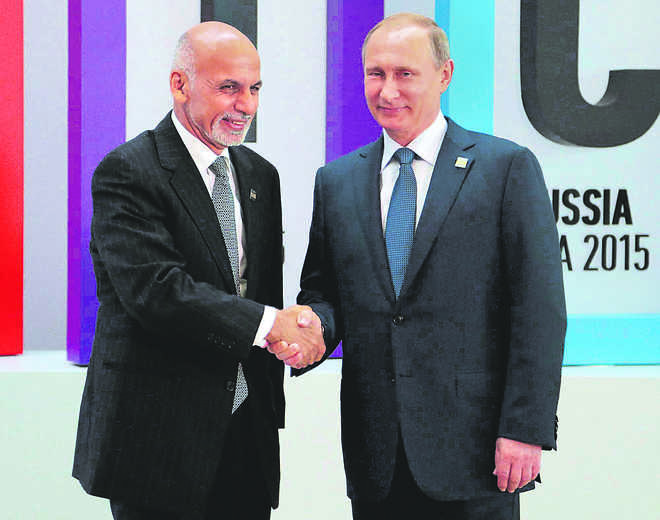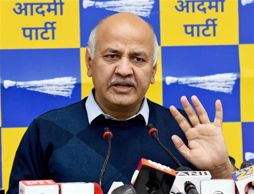
Making amends: Russia is determined to play the peacemaker this time around.
MK Bhadrakumar
THE symbolic weight and the cultural residue of the cult of remembrance of things past are embedded in the Russian national psyche. They combined to make it meaningful that Moscow scheduled the trilateral meeting of Russia, China and Pakistan on Afghanistan on December 27, which is a significant anniversary date of its national history that cannot easily be decontextualised or despatialised. The Indian commentators, with their very limited vocabulary, repertoire and portfolio of text, ritual and symbol in Russia’s tumultuous history altogether miss the plot when they impulsively view the ‘trilateral’ as an unmeditated Russian dalliance with our arch enemy, Pakistan.
It was on December 27, 1979, that the first column of the Red Army under the command of Marshal Sergei Sokolov crossed the Amu Darya and entered Afghanistan from the north even as the 103rd Guards ‘Vitebsk’ airborne division began landing at the airport at Bagram to the north of Kabul, and the momentous deployment of Soviet troops to Afghanistan got under way. Thirty-seven years later, Moscow is preparing for another intervention in Afghanistan — as peacemaker.
The question that is missing in the Indian strategic discourses is: What is it that India can do to join forces with Russia to bring the Afghan conflict to an end?
This has been the third round of the ‘trilateral’ format of Russia, China and Pakistan, but there is heightened interest in the outsiders’ perception. Why so? For a start, Afghan war turns out to be inconclusive and an inflection point arises insofar as the war may breed new hybrid wars, which can infinitely complicate matters. The backdrop too is intriguing. The US President-elect Donald Trump’s interest in following the footfalls of Barack Obama in the Hindu Kush is in serious doubt. He may cut loose early enough. There is general acceptance in American opinion that the Taliban does not threaten US interests.
Trump hasn’t bothered to have a phone conversation with Afghan President Ashraf Ghani. Yet, without US backing (and generous funding), Ghani faces uncertain future. He is on shaky ground, since Afghan state structures lack legitimacy. The parliamentary elections are long overdue and cannot be held and there are no elected provincial councils. Corruption and infighting tear apart Ghani’s US-sponsored government. Trump would know all this. He is unlikely to throw money into black holes. Nor is he in the business of ‘nation-building’. Trump doesn’t fight wars unless American interests are directly threatened.
There is a concerted attempt to hype up the threat from the IS, which is gaining presence in Afghanistan in a hybrid war, as happened in Iraq and Syria. None other than the former head of US Defence Intelligence Agency (and Trump’s National Security Advisor-designate) Gen Michael Flynn is on record that the IS’ rise in Syria stemmed from a ‘wilful decision’ by the Obama administration to promote the agenda to overthrow President Bashar Al-Assad. Turkey’s President Recep Erdogan also claimed last week that Ankara is in possession of ‘confirmed evidence, with pictures, photos and videos’ regarding covert US support to IS in Syria.
Enter Russia. Moscow’s best hope lies in Trump moving away from Obama’s ambivalence and doublespeak on terrorism and put a full stop to using extremist Islamist groups as geopolitical tools. The security and stability of Central Asia and North Caucasus is at stake. Therefore, Russia must do what it takes to safeguard its national security interests. That is the crux of the matter regarding Russia’s ‘return’ to Afghanistan. Russia has no option but to be proactive, because the enemy who is being driven out of Syria and Iraq might regroup any day at the gates to Central Asia and a new hybrid war may begin, tapping into the contradictions thrown up by the Taliban insurgency. Unsurprisingly, Russia began networking with China and Pakistan (and Iran), who would have similar worries regarding the US’ hidden intentions, with a view to somehow bring the Afghan conflict to a settlement by integrating the Taliban.
Fundamentally, therefore, the Indian policymakers need to rethink on three core areas. First and foremost, who are the Taliban? There must be great clarity here. The Taliban began in the nineties as a Pakistani-US-Saudi proxy, which eventually accepted funding from the Al-Qaeda for want of UN aid. It has phenomenally transformed since 2001. Today, it is a fragmented movement with an uninspiring leadership, largely based on Afghan soil. The constant has been Taliban’s substantial support base among Afghan people, which makes it imperative to reconcile with it.
India should have dealt with Taliban as an indigenous movement and established contacts, with the foresight that its eventual integration into Afghan politics would someday become inevitable. Most foreign players with interest in Afghanistan saw the writing on the wall — the UN, US, UK, Germany, France, Norway, Turkey, Iran, Qatar, Central Asian states, China, Russia, etc. But India kept viewing Taliban through the jehad prism of the nineties as a mere Pakistani proxy. This puts India seriously at odds with the regional and world opinion about the Taliban.
Second, the Taliban is not an India-Russia or India-Iran issue, but an issue of inept intelligence work. Simply put, our intelligence operatives found it far more agreeable (and safer) to confine themselves to dealings with Afghan counterparts, with an eye on Pakistan, instead of stepping out to the arduous field work needed to search out for Taliban who are omnipresent — including probably at the very doorstep of the Indian consulates in Jalalabad, Kandahar or Herat but not visible to the naked eye. Policy cannot be twisted as cover-up for shoddy intelligence work. Policy stands exposed as stagnant when it fails to take into account the vicissitudes of time.
Finally, stemming from the above, India’s policy to use Afghanistan as a ‘second front’ against Pakistan negatively impacts the regional security and stability, where regional states — be it China, Central Asian States, Russia or Iran — also happen to be stakeholders. Alas, India has not cared to harmonise its policies with the regional stakeholders and instead bucked the regional trend by consorting with the Obama administration, whereas regional states view with varying degrees of disquiet the US agenda to keep the pot simmering in Afghanistan to create a raison d’etre for its open-ended military presence in a strategic hub of regional politics.
The spectre that is facing India is of the Trump administration reversing the Obama-era ‘great game’ and instead pool efforts with Russia (and China) to influence Pakistan and accelerate a peace process to integrate the Taliban. No one wants the futile war against the Taliban to continue, except apparently India.
The writer is a former ambassador



























